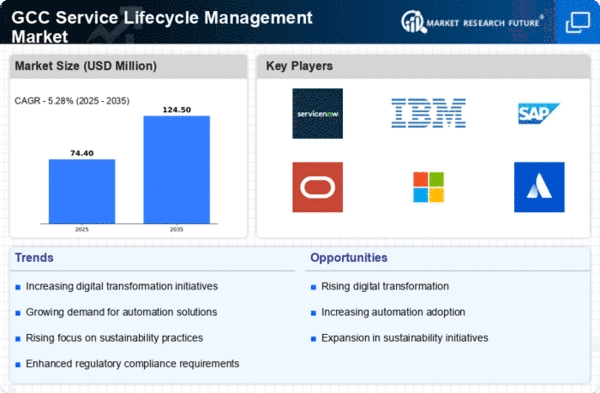Rising Demand for Automation
The service lifecycle-management market is experiencing a notable surge in demand for automation solutions across various sectors in the GCC. Organizations are increasingly recognizing the potential of automation to enhance operational efficiency and reduce costs. According to recent data, the automation market in the region is projected to grow at a CAGR of 15% over the next five years. This trend is likely to drive investments in service lifecycle-management tools that facilitate automated processes, thereby streamlining service delivery and improving customer satisfaction. As businesses strive to remain competitive, the integration of automated service lifecycle-management solutions appears essential for optimizing resource allocation and minimizing human error.
Increased Focus on Data Analytics
In the service lifecycle-management market, the emphasis on data analytics is becoming increasingly pronounced. Companies in the GCC are leveraging advanced analytics to gain insights into service performance, customer behavior, and operational bottlenecks. This shift is supported by the growing availability of big data technologies and analytics tools, which enable organizations to make data-driven decisions. It is estimated that organizations utilizing data analytics can improve service efficiency by up to 30%. Consequently, the demand for service lifecycle-management solutions that incorporate robust analytics capabilities is likely to rise, as businesses seek to enhance their service offerings and respond more effectively to market dynamics.
Expansion of Cloud-Based Solutions
The service lifecycle-management market is witnessing a significant transition towards cloud-based solutions in the GCC. This shift is driven by the increasing need for flexibility, scalability, and cost-effectiveness in service management. Cloud solutions allow organizations to access service lifecycle-management tools from anywhere, facilitating remote work and collaboration. Recent statistics indicate that the adoption of cloud services in the region is expected to reach 70% by 2026. As businesses migrate to the cloud, the demand for integrated service lifecycle-management platforms that offer seamless connectivity and real-time updates is likely to grow, enabling organizations to enhance their service delivery capabilities.
Regulatory Compliance and Standards
The service lifecycle-management market is increasingly influenced by the need for regulatory compliance. Adherence to industry standards in the GCC is also crucial. Governments and regulatory bodies are implementing stringent guidelines to ensure quality and safety in service delivery. This regulatory landscape compels organizations to adopt service lifecycle-management solutions that facilitate compliance tracking and reporting. It is projected that companies investing in compliance-focused service lifecycle-management tools can reduce the risk of non-compliance penalties by up to 40%. As a result, the market for service lifecycle-management solutions that prioritize regulatory adherence is expected to expand, as businesses strive to meet legal requirements while maintaining operational efficiency.
Growing Emphasis on Customer Experience
In the service lifecycle-management market, there is a growing emphasis on enhancing customer experience across the GCC. Organizations are increasingly recognizing that superior service delivery is crucial for customer retention and brand loyalty. This trend is reflected in the rising investments in service lifecycle-management solutions that prioritize customer engagement and satisfaction. Recent surveys indicate that companies focusing on customer experience can achieve a 20% increase in customer retention rates. As businesses seek to differentiate themselves in a competitive landscape, the demand for service lifecycle-management tools that enable personalized service offerings and proactive customer support is likely to rise.

















